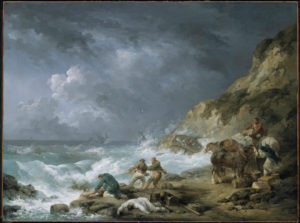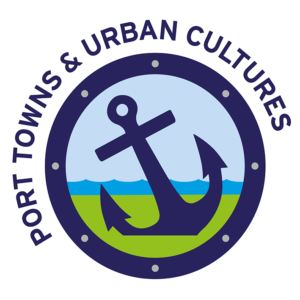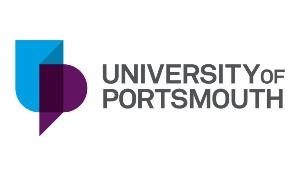We at Port Towns and Urban Cultures are excited to announce a fully funded “Coastal History” PhD opportunity. This split-site PhD will provide the successful candidate with the unique opportunity to research and teach in both Britain and Sweden, thanks to a new collaboration established between the University of Portsmouth and Halmstad University.
The PhD will be based in the Faculty of Humanities and Social Sciences, University of Portsmouth, and will be supervised by a UK-Swedish team which comprises Dr Cathryn Pearce (PTUC, Portsmouth), Dr Jens Lerbom (Halmstad) and Dr Robert James (PTUC, Portsmouth).
Dr Cathryn Pearce is an experienced PhD supervisor and a leading scholar in British wrecking practices and coastal communities in the 18th and 19th centuries. She has been instrumental in developing the coastal history methodology and contributed to David Worthington’s anthology The New Coastal History: Cultural and Environmental Perspectives from Scotland and Beyond (2017). She also lectures on the highly successful distance learning MA Naval History programme at the University of Portsmouth.
I am looking forward to working with the successful candidate on what is an exciting opportunity to engage in coastal history, and to uncover the history and interconnectivity of wrecking practices of coastal communities of the North Sea rim.
Dr Cathryn Pearce
Project description
In Europe, the practice of ‘wrecking’—whether pillaging wrecked ships or harvesting what has washed ashore— has been the subject of multiple forms of legal and social control. The history of wrecking has received increasing scholarly attention, focusing on two main themes: the truth or falsity of wrecking narratives and the legal and social relationship between commoners and manorial lords in wrecking and salvage practices.
The multi-cultural nature of your PhD will allow you to advance these studies both spatially and temporally. By adopting the tools of digital humanities and a coastal history framework, you will engage in a comparative analysis by integrating qualitative data (e.g. legal records, manorial court records, local newspapers, folklore, and contemporary literature) with a visual topography of the coastal area.
By mapping coastal settlements and their relationships to shifting legal boundaries and jurisdictions, shipping lanes, sites of shipwrecks, and moral geographies, the entangled practices of wrecking, and the particularities of place, space and coastal connections will be uncovered. You will be able to determine the significance of wrecking to coastal, national and adjacent pluriactive communities in the mid-18th to 19th-century North Sea region of eastern England and western Sweden, and to demonstrate how cultural practices, identity and interconnectivity have manifested themselves across watery borderlands.
Your PhD project will enhance the strong links established between Halmstad and Portsmouth by adding to a vibrant culture of research exchange. You would be expected to publish short research blogs on the PTUC website and showcase your research at international conferences during your funding, as well as contributing to an emerging research milieu in Halmstad.
By working on this project you will:
- Employ innovative digital humanities techniques introduced by the University of Halmstad’s (UH) Digital Humanities Doctoral Training Programme to provide new insights into the social and cultural history of coastal societies through the study of wrecking practices.
- Benefit from the Port Town’s and Urban Culture team’s wealth of knowledge and international networks while simultaneously showcasing cutting-edge research into coastal communities.
- Acquire enhanced doctoral programme training from both institutions and will spend a minimum of one term each teaching at UoP and at UH, thus gaining research and teaching experience in different cultural settings.
Application details and eligibility criteria can be found at the foot of this article.
Funding Notes
Fully-funded Split-Site PhD Project with the University of Portsmouth and Halmstad University.
Bursary recipients will receive an annual stipend (currently £15,009 p.a.), £2,000 for project costs/consumables and an additional sum for the costs for travelling and accommodation associated with a split-site programme.
Context to the Split-Site PhD
The collaboration seemed like a natural fit and we are delighted to be able to offer our students this unrivalled opportunity.
Professor Brad Beaven, Project Lead, Port Towns and Urban Cultures, University of Portsmouth
Students will have the best of both worlds – they will have access to the expertise of staff and gain research training from two Universities.
Dr Simon Stewart, Director of the Centre of European Studies Research
This collaboration has led researchers at both universities to recognise the synergies between their interdisciplinary research culture and they are keen to work on a range of collaborative projects. These include:
- Co-authorship of research outputs
- Research bid collaboration
- Exploring research collaboration in the digital humanities
- Co-editing a journal special issue
- Co-teaching and at undergraduate and postgraduate level including developing joint MRes opportunities.
Halmstad University is a medium-sized university located within an hour of Gothenburg, Sweden. The University has traditionally focused on science and engineering but it has a burgeoning research culture in the humanities and social sciences. It has a growing reputation for teaching and research in the digital humanities and it has invested significantly in state-of-the-art technologies and facilities.
General admissions criteria for the PhD
You’ll need a good first degree from an internationally recognised university (minimum upper second class or equivalent, depending on your chosen course) or a Master’s degree in History or an appropriate subject. In exceptional cases, we may consider equivalent professional experience and/or qualifications. English language proficiency at a minimum of IELTS band 6.5 with no component score below 6.0.
Specific candidate requirements
The bursary is open to UK and EU citizens only.
You must be prepared to live and work in both Halmstad and Portsmouth. You must be willing to teach up to four hours a week during term time, there will be teaching opportunities in both Portsmouth and Halmstad. Understanding of the Swedish language would be desirable (there is an opportunity to join a Swedish for beginners class).
How to Apply
We’d encourage you to contact Dr Cathryn Pearce (cathryn.pearce@port.ac.uk) to discuss your interest before you apply, quoting the project code.
When you are ready to apply, you can submit your application via the ‘Apply Now’ link on the University of Portsmouth’s History Postgraduate Research Degrees webpage (https://www.port.ac.uk/study/courses/pgr-history). Make sure you submit a personal statement, proof of your degrees and grades, details of two referees, proof of your English language proficiency and an up-to-date CV. Our ‘How to Apply’ page offers further guidance on the PhD application process.
If you want to be considered for this funded PhD opportunity you must quote project code SASH5480620 when applying.
Closing date: 19 June 2020
















Comments are closed.